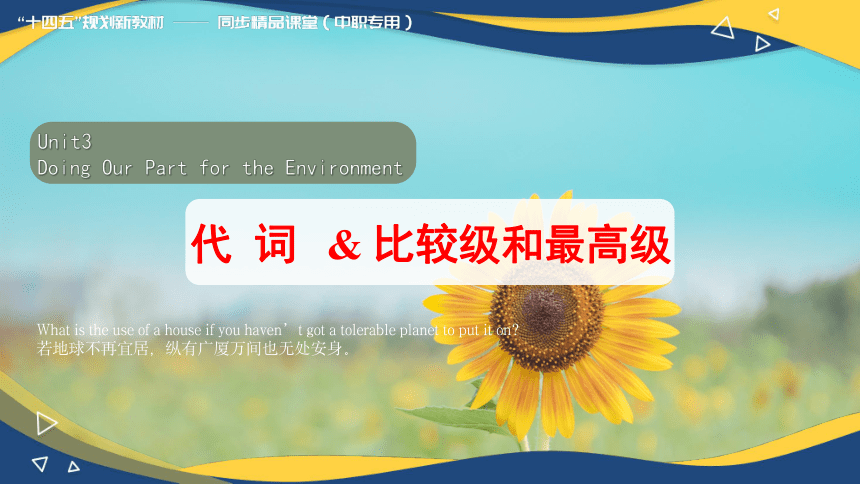(
课件网) 代 词 & 比较级和最高级 Unit3 Doing Our Part for the Environment What is the use of a house if you haven’t got a tolerable planet to put it on 若地球不再宜居,纵有广厦万间也无处安身。 knowledge objectives ability objectives emotional objectives To master the usage of pronouns and comparison. To be able to use pronouns and comparison correctly. To understand the importance of environmental protection. Learning objectives Pronouns “ ” 携手创建文明城市 Part 1 人称代词 主格 宾格 单数 I 复数 单数 you 复数 单数1 he 单数2 she 单数3 it 复数 第一人称 第二人称 第三人称 we you they me us you you him her it them 人称代词 什么时候用主格?宾格? I like her. 主格 宾格 口诀: 动词前用主格 动/介词后用宾格 I am proud of her. 主格 宾格 人称代词 多人称并列时,谁前谁后? 口诀: 单数231 复数123 1._____will study together. 你,我还有他将一起学习。 2._____are glad to help others. 我们、你们和他们很乐意帮助他人。 3._____are the same. 我们和他们都一样。 You,he and I We,you and they We and they 形容词性 名词性 单数 I 复数 单数 you 复数 单数1 he 单数2 she 单数3 it 复数 物主代词 第一人称 第二人称 第三人称 our your their mine ours yours yours his hers its theirs 物主代词 两种物主代词有什么关系? This is my cat. This cat is mine. 形容词性物主代词+名词=名词性物主代词 这是我的猫。 口诀: 有名“形代” 无名“名代” 反身代词 反身代词 中文 单数 myself 复数 单数 yourself 复数 单数1 himself 单数2 herself 单数3 itself 复数 第一人称 第二人称 第三人称 myselves yourselves themselves 我自己 我们自己 你自己 你们自己 他自己 她自己 它自己 他们自己 反身代词 enjoy oneself 玩的开心 dress onself 自己穿衣服 be oneself 身心自在 by oneself 亲自 teach oneself 自学 help oneself to 随便吃 talk to oneself 自言自语 introduce oneself 自我介绍 指示代词 近指 远指 指示代词 this(这个) that(那个) these(这些) those(那些) that的用法1: 打电话 --Hello,Who's that speaking --Hi,this is Jessica 打电话时, that是“你” this是“我” 指示代词 that的用法2:比较句 1.The weather in Wuhan is hotter than _____ in Beijing. 武汉比北京的天气要热。 2.Apples on this tree are more than_____ on that tree. 这棵树上的苹果比那颗树上的多。 1.that用于比较句中,指代前文出现的单数名词。(weather) those that 2.those在比较句中指代复数名词。(apples) 不定代词 -one (人) -body(人) -thing(物) -where(地点) some- someone (某人) somebody (某人) something (某事) somewhere (某地) any- anyone (任何人) anybody (任何人) anything (任何事) anywhere (任何地方) every- everyone (每个人) everybody (每个人) everything (所有事) everywhere (所有地方) no- no one (没人) nobody (没人) nothing (没什么) nowhere (任何地方都不) 不定代词 可数 不可数 few & little a few(一些) a little(一些) few(几乎没有) little(几乎没有) many &much many(很多) much(很多) 每个 each(强调个体) every(强调整体) 不定代词 either 两者中的任意一个 neither 两者都不 e.g:I want to eat another banana. 我想再吃一根香蕉。 You can take either of the two pens. 你可以从这两支笔中任意拿一 ... ...

